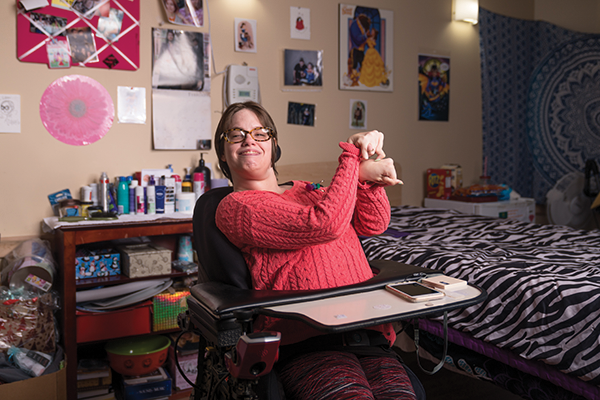The room was packed. The chairs filled first. Extra chairs were brought out. Then the aisles filled with people until finally, the doors opened so attendees could pour out and watch the
The No More Warehousing: Time for Housing and Dignity for Nova Scotia’s Severely Physically Disabled panel was held at the Halifax Central Library last week.
“I was elated by the turnout,” says Jen Powley, author and activist. She organized the panel with Independent Living Nova Scotia and a group of women with severe physical disabilities under the age of 50 who live in nursing homes. She wanted to learn about how the other
The six
Vicky Levack, a 28-year-old with cerebral palsy, was a
“We have different needs,” says Levack. “I don’t have dementia. I don’t have severe mental impairments, so I don’t require the care that someone with severe mental impairments would.”
Small options homes (also known as group homes) would allow her to live with people who require similar care. “I don’t need to be watched 24 hours a day,” she says. “I just need someone to be there.”
But there are no group homes that can provide the level of physical care she needs so the nursing home was her only option, “unless I wanted to live with my parents for the rest of my life,” she says.
Levack was fighting through depression when she first moved
During that time Levack was also assaulted by a senior having a mental episode due to dementia. “The woman would lash out violently,” Levack says. She approached Levack from behind and choked her with the glasses strap around her neck. Luckily, the strap broke. Levack got away, but not without trauma, she says. “I thought I was going to die.”
According to the 2016 census, 240 Nova Scotians between 18 and 60 years old are living in nursing homes, often because of a physical disability. Another 600 are institutionalized, or “warehoused”—put in any facility that is out of the way, or inappropriate for their needs—in remote locations across Nova Scotia. Small options homes allow people with a similar level of care to live together and lead independent lives as an alternative to living in facilities.
The provincial government has a plan for improving long-term care facilities, but NDP MLA Susan Leblanc says progress has been delayed long enough. The five-year road map “would be done by now” if it met the goals it set out, says Leblanc. However, when the government party changed, it stretched out to a 10-year plan, which is also “pretty far behind on the work,” she says.
“We have to have a strong voice and call for real, meaningful action on the road map so that people can live in a community according to their own choices.”
Levack says one change that might help in the short term is more funding for recreation and mental health services for young adults in long term care facilities.
Jen Powley and Independent Living Nova Scotia have organized to take the matter to the provincial legislature in the coming weeks.

